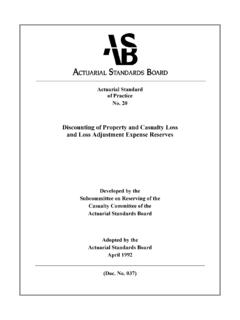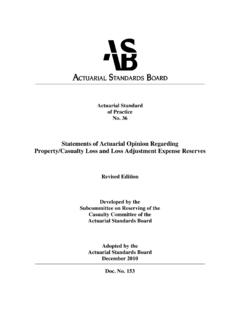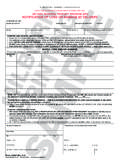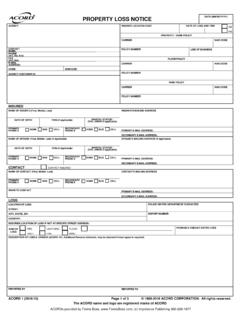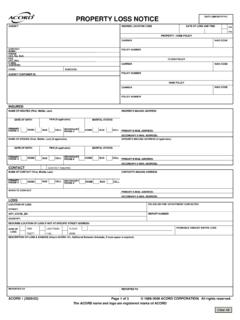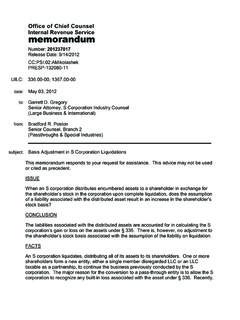Transcription of LIABILITY FOR LOSS, DAMAGE, DESTRUCTION, OR THEFT …
1 LIABILITY FOR loss , damage , destruction , OR THEFT OF GOVERNMENT property IN THE POSSESSION OF CONTRACTORS by Dr. Douglas N. Goetz, CPPM, CF The views expressed herein are those of the author and do not necessarily reflect the views of the Defense Acquisition University or the Department of Defense. I have lectured extensively about the issue of LIABILITY . It is one of my FAVORITE areas and one that is much misunderstood, and even more disturbing, much misapplied by even the most experienced Government property Administrator and Contractor employee. Therefore, with the rewrite of FAR Part 45 it seems a propitious time to resurface the topic and expand the depth and breadth of discussion.
2 I will cover the two most frequently used forms of LIABILITY the full risk of loss provisions and the limited risk of loss provisions. And yes, in this article, the Drunken Forklift Operator WILL ride again!!! As this is a revisitation of LIABILITY , I have learned a few things since last writing about this topic: 1. People generally respond EMOTIONALLY to this topic! We often hear the following, You lost, damaged or destroyed my property ! How could you? Well, you d better PAY UP! Maybe maybe not! Emotion, whether on the part of the Government property Administrator, Commanding Officer, Contracting Officer or the contractor s personnel either managerial or property clerk, has no place in the determination of LIABILITY under a contract.
3 Disregard all of your emotional baggage and think purely analytically. 2. People do not READ THE CONTRACT! I cannot tell you the number of times that I have had a telephone call from a property professional in the field. They say, We just had an incident where the contractor destroyed some Government property . Are they liable? How should I know? First off READ THE CONTRACT! Which Government property Clause is in the contract? Until you have determined this first step, all other determinations are for naught. 3. Bosses generally respond emotionally. Read item 1 above. Regardless of how much analysis the Government property Administrator has engaged in his or her boss responds in an emotional fashion.
4 Emotion has no place in this determination. So, with that said let s have at it -- a discussion of the TECHNICAL issues of LIABILITY for loss , damage or destruction of Government property in the possession of contractors. For the traditional LIABILITY provisions (Full and Limited), I plan to divide this discussion into five parts. These parts consist of: - The Government s Policy - The Clausal Requirements - Why? (c) 2008 DNGOETZ1- The Contractor property Administrator Responsibilities, and - The Government property Administrator Responsibilities. I plan to walk through these parts in an attempt to establish the various relationships that exist between all of the players as well as provide a firm regulatory and legalistic perspective so all of us may understand the workings of the LIABILITY process and product.
5 THE GOVERNMENT S POLICY The Federal Government's official policy towards LIABILITY for loss , damage or destruction is contained within the Federal Acquisition Regulation (FAR) at entitled "Responsibility and LIABILITY for Government property ." It states "(a). Generally, contractors are not held liable for loss , damage , destruction , or THEFT of Government property under the following types of contracts -- (1) Cost reimbursement contracts; (2) Time and material contracts; (3) Labor hour contracts; and (4) Negotiated fixed price contracts for which the price is not based upon an exception at FAR The first part of this sentence seems simple enough; generally the contractor is not held liable for the loss , damage , destruction , or THEFT of Government property .
6 , the contractor is not liable. But the Government added that simple word GENERALLY. What does this mean? Simply put, there are situations where the Government MAY REQUIRE that the contractor be held liable or there may be actions taken or not taken that cause a contractor to be liable. Can the Government change its mind and say that the contractor IS responsible and liable for Government property ? Yes, there are! We have to consider the second part of the sentence where a variety of contract types are listed. These include: (1) Cost reimbursement contracts; (2) Time and material contracts; (3) Labor hour contracts; and (4) Negotiated fixed price contracts for which the price is not based upon an exception at FAR Under these SPECIFIC types of contracts it is the GENERAL policy that contractors are NOT liable for the loss , damage , destruction , or THEFT of Government property .
7 In this case the Limited Risk of loss provision of the Government property clause is applicable, specifically FAR (h). But there are OTHER types of contracts and even situations where the contractor IS held Liable. There is one pricing arrangement that is NOT included within the four listed above that is a FIRM FIXED PRICE Contract where an exception at FAR APPLIES. If a FIXED PRICE contract is awarded the contracting officer may require the contractor to be liable for the loss , damage , destruction , or THEFT of Government property . The (c) 2008 DNGOETZ2contracting officer would do this through the inclusion of the Alternate I to FAR what is referred to as at Full risk of loss provision.
8 Lastly, in this policy section there is one other point of discussion regarding loss , damage , destruction or THEFT of Government property . FAR additionally states, The contracting officer may revoke the Government s assumption of risk when the property administrator determines that the contractor s property management practices are inadequate and/or present an undue risk to the Government. I am not going to discuss the "WHYS" at this point. I will leave that for later. From this perspective, we should be able to see, or at least have some idea, that there appear to be two forms of LIABILITY emerging Our initial statement that under certain types of contracts the contractor is generally not held liable that under another type of contract the contractor is liable for government property .
9 But wait a minute, you say, This section, FAR , is policy, and I m a contractor, and policy is not binding upon me unless implemented through some type of contractual obligation. Let us see where this implementation occurs. CLAUSAL REQUIREMENTS The first place for us to look for a contractual obligation would be the Government property clauses. It would be logical to also look at the simplest form of contract - the Fixed Price contract. It is important to note that this analysis will deal first with the FULL risk of loss provision and then with the LIMITED risk of loss . Firm Fixed Price Contract The Fixed Price Government property Clause is found at FAR The specific section of this clause that deals with LIABILITY is found at Alternate I, paragraph (h).
10 It states, "The Contractor assumes the risk of, and shall be responsible for, any loss , damage , destruction , or THEFT of Government property upon its delivery to the Contractor as Government furnished property . However, the Contractor is not responsible for reasonable wear and tear to Government property or for Government property properly consumed in performing this contract." It's nice to be able to cite the FAR but we must go one step further and interpret its meaning. Very simply, under this clause the Contractor is responsible for ALL loss , damage and destruction of Government property - REGARDLESS OF HOW IT HAPPENS! Whether it was a loss through THEFT , damaged through fire or flood, or destroyed through a California earthquake makes no difference whatsoever.
